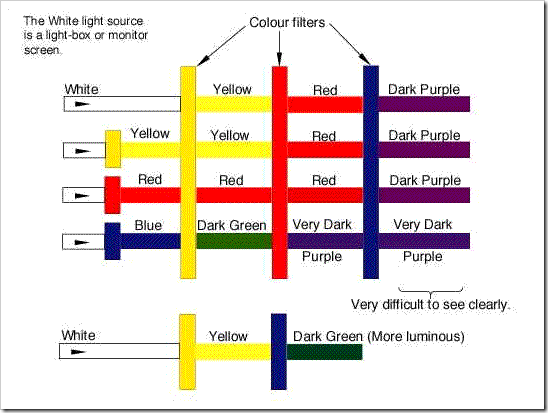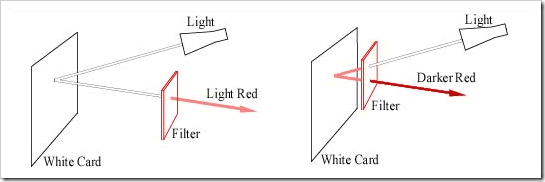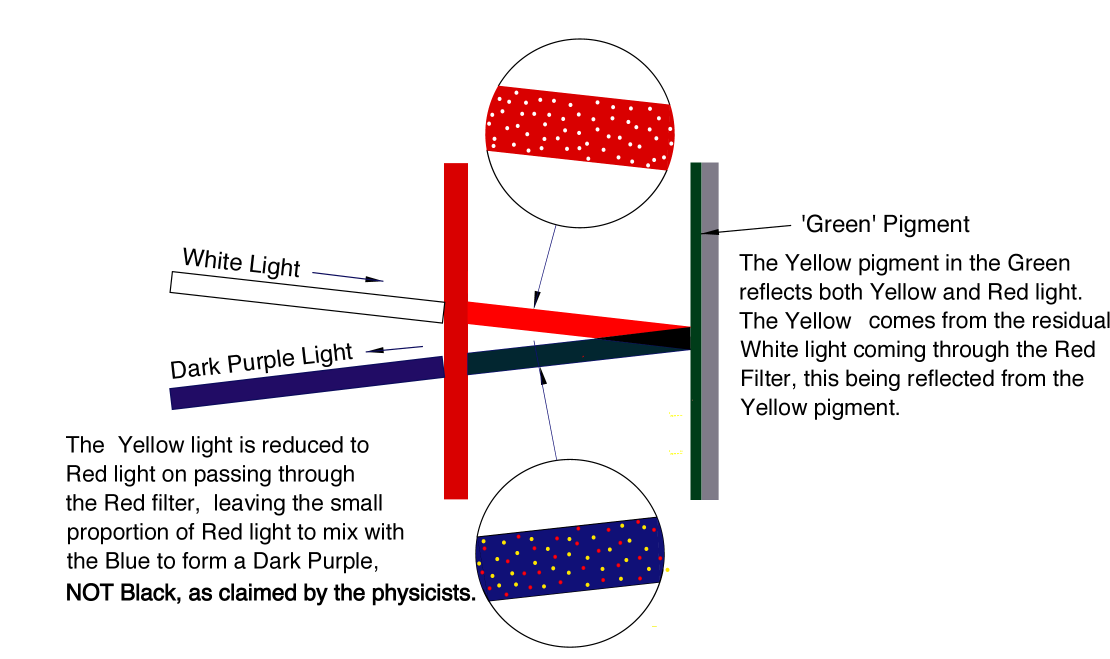-
Colour Filters- The Mechanics.
Posted on October 26th, 2009 No commentsPhysicists have never grasped the mechanics of colour or colour filters.
Most books on physics claim that Yellow is not a primary colour and that it is a combination of Green and Red light. This is based on the fact that both Yellow and Blue light will pass through a Green Filter. They say that Blue does not pass through a Red filter, which is untrue. They also claim that Red will not pass through a Blue filter, which is also untrue. In fact the filters reduce the energy of any light passing through them. White light passing through a Yellow filter will have its energy reduced into the Yellow range. The Red filter reduces the light into the Red range, and the Blue filter further reduces the light into the Blue range. The Yellow light exiting the Yellow filter carries some White light, the Red light exiting the Red filter carries some Yellow light and the Blue light exiting the Blue filter carries some Red light. The lower the energy of the light the easier it passes through a filter. White light passing through a Blue filter always gives you Blue plus White.
In the sketch below the Blue light passes through the yellow filter easily but the residual White from the Blue filter picks up some Yellow light, therefore creating a Dark Green. The higher energy Yellow is mostly reduced to Red while passing through the Red filter, leaving the lower energy Blue to pass through without difficulty.

Colour filters are not really filters they are optical resistances. They reduce the energy of light passing through them, they do not filter anything out of the light. A light beam loses energy by reflection and heat. A beam of White light striking the surface of a filter reflects a considerable amount of White light. The darker the filter, the greater the energy lost to reflection. A Dark Blue filter reflects almost White light, a Red filter reflects a bright Rose Pink, and a Yellow filter reflects a distinct Yellow. Energy is lost in the heating up of the filter itself, again the darker the colour the greater the heat loss.
Note: None of the ‘standard’ colours of pigments, or the RGB, CYMK, etc of monitors can produce the actual ‘true’ primary colours. The colours in the above drawing are only approximate. The closest are Red, Navy, and a slightly deeper version of the Yellow. With the addition of White and Black all other colours can be produced from these. See ‘Origin of Colour’
The colour of light passing through a filter depends on various conditions. It depends on the intensity of the light source and the colour of the light source. The simple experiment below demonstrates the type of logic error common in physics research. The left hand sketch shows white light reflected from a White card and then passing through a Red filter. Most people consider that if they lay a Red filter on a white board then the White light from the board shines through the filter in the same way as the left hand sketch. This is not true, because the light passing through the filter from the board is Red, not White, as indicated in the right hand sketch.

Why can a lower energy colour such as Blue pass easily through Red and Yellow filters, yet higher energy colours like Red and Yellow have difficulty passing through a Blue filter? The answer is simple mechanics.
The light passing through a filter may be compared with well-protected dodgem cars travelling along a wide highway that is scattered with large concrete blocks. The cars travelling at low speed will be able to negotiate these obstacles without mishap, and without much loss of speed. If the speed increases there will be collisions with the obstacles or other cars. The greater the speed, the greater the chance of collisions occurring. Comparing with light filters, the Blue filter would have many concrete blocks; Red would have less and Yellow even fewer.
It is obvious that the lower speed cars would have no difficulty passing through areas with fewer concrete blocks. This means that the cars (Particles) having the least energy have the least difficulty in passing through the obstacle course (Filter).
The interactions between cars (Particles) would be considerable, collisions causing some cars to accelerate and others to be slowed down, and some to be deflected off the side of the road (Heat emission). Some of the higher speed cars could pass through the area with little loss of speed, slight collisions with other cars deflecting them away from concrete blocks.
While on the subject of filters let us look at some others aspects of the physicists hypotheses on colour. Consider the arguments that White light is composed of all the other colours. This is on the basis that all other colours can be obtained from White light. This is a very weak hypothesis. If you have a 120 volt power supply you can obtain 100v, 24v, 12v, 6v, 3v or 1.5v from it. This does not mean that a 120 volt power supply is made up of all the lesser voltages.
As already shown you can obtain Red, Blue and Green light from Yellow light. This does not mean that Yellow light is made from Red, Blue and Green light.
The physicists statements that Blue light has the greatest energy is based on the illogical argument that “in a deep filter only Blue light passes through it and this proves that Blue light must have more energy.” Obviously they are forced to this conclusion by their conviction that White light is a combination of all the other colours. Using the same type of “logic” they could claim that as the water coming from the end of a 10km long x 25mm diameter. pipeline is only at a very low pressure, then this proves that only very low pressure water has the energy to travel this far!
Green Filters.
There are a lot of hits on the subject of Green filters. White light passing through a Green (mixed pigments of Yellow and Blue.) filter, results in a mixture of White, Yellow, Blue and normally a small amount of Red. (See Projected Light). The Red comes from a small amount of the Yellow light losing enough energy to fall into the Red range.
The colour seen through a filter depends on the make-up of the particular filter. If a green filter is a mixture of 10% Yellow and 90% Blue pigments, then approx. 10% of Yellow light will pass through. However, if the filter is 90% Yellow and 10% Blue then the light will probably contain a larger proportion of Red. The Yellow pigments will allow Yellow, Red and Blue light to pass through, the Blue pigments will only allow Blue light through, (With a touch of Red). This problem applies to all colour filters. A Royal Blue pigment is a mixture of Blue and Red pigments. Only by determining the basic ‘True Colours” can we create a scientific basis for colour, and form a common standard based on the actual physics of colour.
When considering colour filter set-ups it is essential to look at the mechanics of the system.
Consider where White light passes through a Red filter, reflects off a Green coloured board, and the board is viewed through the Red filter. The physicists argue that the Green is seen as Black through the Red filter. This is not so.
Green is a mixture ‘true’ Blue, (a very dark Blue), and ‘true’ Yellow, the actual shade depending on the relative proportions. The residual White light (See Projected Light) is reflected off the Green board as a mixture of ‘true’ Blue and ‘true’ Yellow light, and the Red light exiting the filter will be reflected off the Yellow pigment as Red and off the Blue pigment as Blue.. The Blue, on the second pass, will easily go through the Red filter but the Yellow light is mainly reduced into the Red range. We are therefore looking at a very dark Purple colour, which, under normal viewing conditions is easily mistaken for Black.

Reflected Green Light
If the Green is a light Green, this may because it has a greater proportion of Yellow pigment, or because it has a percentage of White pigment included. In this situation the Green board will appear to be a lighter purple.
A bit complicated, but mechanics is complicated, the main reason physicists can’t understand it.
Author, Brian Williams
GO TO “Master Page – Index” for related Colour posts that will help you to understand colour.
Technorati Tags: Colour FiltersNew Research on Colour Colour Filters, Colour filters in physics, Green Filters, mechanics-of-colour-filters, new-research-on-colour, Primary Colours122 responses to “Colour Filters- The Mechanics.”
-
Good – I should certainly pronounce, impressed with your site. I had no trouble navigating through all the tabs and related info ended up being truly easy to do to access. I recently found what I hoped for before you know it at all. Reasonably unusual. Is likely to appreciate it for those who add forums or anything, web site theme . a tones way for your client to communicate. Nice task..
-
I like to see writers express themselves so well. This writer apparently has a good grasp not only on the topic at hand, but on how to keep the content clear and easy to understand.
-
Howdy would you mind letting me know which webhost you’re using? I’ve loaded your blog in 3 different web
browsers and I must say this blog loads a lot faster then most. Can you suggest a good web hosting provider at a fair price?
Thanks, I appreciate it!
———————-
Hi. I am not a computer or web site expert. However, the speed of loading of a web page depends on the content of that particular web page. Graphics and backgrounds take a lot longer to load than text Shaded backgrounds take longer. If a web page includes a sound track or video section this increases the loading time. Advertising garbage can drastically increase the loading times. A drawing (graphic) will load a lot faster than a photograph. The hosting speed has little affect on the loading speed of a web site. You can check the speed of your web page by checking the speed of printing on your own printer, adjusting the content until you get a fast print speed.
Brian -
Hey! I just want to mention that i like your publishing way which thus Im going to follow your blog regularly from now on Keep writing!
-
I was reading some of your articles on this website and I think this web site is very instructive! Keep putting up.
-
A person essentially help to make seriously articles I would state. This is the very first time I frequented your web page and thus far? I surprised with the research you made to make this particular publish extraordinary. Fantastic job!
-
I noticed that it’s hard to find your website in google, i found it on 26th spot, you should get some quality backlinks to rank it in google and increase traffic. I had the same problem with my blog, your should search in google for – insane google ranking boost – it helped me a lot.
_________________________________
Hi, I checked your comment. (On Page 3 out of 3,540,000 pages would seem fairly good to me.) However today (10/12/2013) Physics or Fantasy stands at No 4 in Google out of 35,400,000, and is No 1 & 2 in Bing out of 8,000,000. This without any backlinks or special SEO expertise.
Your position mostly depends on the content of the website. At least on my website you find things not covered by any other World source. Over that last 6 months I have checked on about 50 ‘expert’ sites offering to improve my rankings, and never found any within the top 100 positions,(like most people, I tend to give up after the first 100.)
Brian -
Excellent items from you, man. I have take note your stuff prior to and you are simply extremely excellent. I really like what you have acquired here, really like what you are saying and the way in which in which you are saying it. You’re making it entertaining and you continue to take care of to stay it wise. I cant wait to learn far more from you. This is really a wonderful site.|
-
I’m very pleased to discover this page. I want to to thank you for your time just for this fantastic read!! I definitely really liked every bit of it and I have you saved as a favorite to see new information on your web site.
-
Way cool! Some very valid points! I appreciate you penning this article and the rest of the site is very good.
-
This page truly has all of the info I wanted concerning this subject and didn’t know who to ask.
-
I simply wanted to write down a simple note so as to thank you for those unique guidelines you are posting on this website. My considerable internet research has finally been compensated with wonderful details to share with my great friends. I ‘d mention that many of us website visitors actually are truly fortunate to exist in a remarkable site with many awesome individuals with beneficial techniques. I feel quite lucky to have encountered your web page and look forward to many more exciting moments reading here. Thanks a lot again for all the details.
-
I like it whenever people get together and share opinions. Great site, stick with it!
-
Hey! Someone in my Myspace group shared this website with us so I came to look it over.
I’m definitely loving the information. I’m bookmarking and
will be tweeting this to my followers! Outstanding blog and
excellent style and design. -
I am only commenting to let you understand of the great encounter my child gained using yuor web blog. She figured out lots of pieces, most notably how it is like to have a wonderful helping spirit to have the mediocre ones quite simply completely grasp specified complicated things. You actually surpassed readers’ expectations. Thanks for delivering the beneficial, safe, explanatory and as well as fun thoughts on your topic to Mary.
-
Pretty! This has been an incredibly wonderful post. Thank you for supplying these details.
-
Great post! We will be linking to this particularly great article on our website. Keep up the good writing.
-
Appreciate it for all your efforts that you have put in this. very interesting information.
-
Can I just say what a relief to find someone who actually is aware of what theyre talking about on the internet. You undoubtedly know how to carry a problem to gentle and make it important. More people need to read this and understand this aspect of the story. I cant consider youre not more well-liked because you definitely have the gift.
-
I have some problems with some colour filters using! thanks a lot of this explanation!
-
Really enjoyed this post.Thanks Again. Much obliged.
-
I’m very happy to read this. This is the kind of details that needs to be given and not the random misinformation that’s at the other blogs. Appreciate your sharing this best doc.
Leave a reply
-

